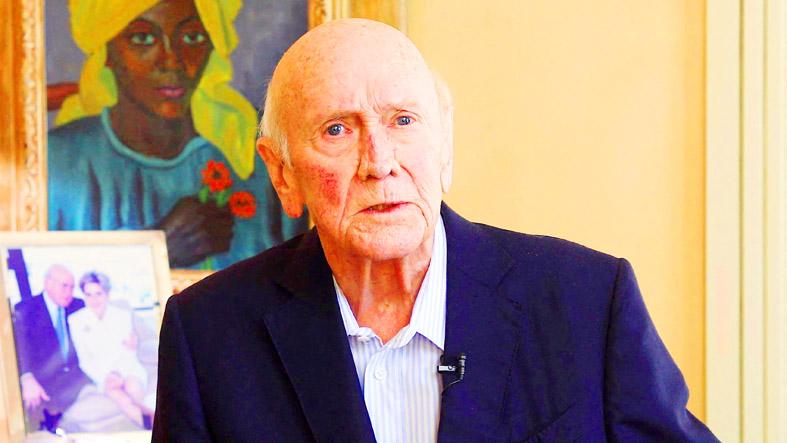F.W. de Klerk, who shared the Nobel Peace Prize with Nelson Mandela and as South Africa’s last apartheid president oversaw the end of the country’s white minority rule, has died aged 85.
Frederik Willem de Klerk died after a battle against cancer at his home in the Fresnaye area of Cape Town, a spokesman for his foundation confirmed on Thursday.
De Klerk was a controversial figure in South Africa where many blamed him for violence against black South Africans and anti-apartheid activists during his time in power, while some white South Africans saw his efforts to end apartheid as a betrayal.

Photo: AFP / FW Der Klerk Foundation
“De Klerk’s legacy is a big one. It is also an uneven one, something South Africans are called to reckon with in this moment,” the Mandela Foundation said of his death.
Retired Anglican archbishop Desmond Tutu, another towering anti-apartheid activist, issued a similarly guarded statement about De Klerk’s death.
De Klerk “played an important role in South Africa’s history ... he recognized the moment for change and demonstrated the will to act on it,” Tutu’s foundation said.
De Klerk tried to avoid responsibility for the enormity of the abuses of apartheid, including in his testimony at the South African Truth and Reconciliation Commission, which was chaired by Tutu.
At that time, Tutu expressed disappointment that De Klerk did not fully apologize for the evils of apartheid, the statement said.
Even posthumously, De Klerk sought to address this criticism in a video message in which he said he was sorry for his role in apartheid. His foundation released the video after announcing his death.
“Let me today, in the last message repeat: I, without qualification, apologize for the pain and the hurt, and the indignity, and the damage, to black, brown and Indians in South Africa,” said a visibly gaunt and frail De Klerk.
He said his view of apartheid had changed since the early 1980s.
“It was as if I had a conversion, and in my heart of hearts, I realized that apartheid was wrong. I realized that we have arrived at a place which was morally unjustifiable.”
South African President Cyril Ramaphosa said that De Klerk “played a vital role in our transition to democracy in the 1990s... He took the courageous decision to unban political parties, release political prisoners and enter into negotiations with the liberation movement amid severe pressure to the contrary from many in his political constituency.”
It was De Klerk who in a speech to South Africa’s parliament on Feb. 2, 1990, announced that Mandela would be released from prison after 27 years. The announcement electrified a country that for decades had been scorned and sanctioned by much of the world for its brutal system of racial discrimination known as apartheid.
With South Africa’s isolation deepening and its once-solid economy deteriorating, De Klerk, who had been elected president just five months earlier, also announced in the same speech the lifting of a ban on the African National Congress and other anti-apartheid political groups.

Packed crowds in India celebrating their cricket team’s victory ended in a deadly stampede on Wednesday, with 11 mainly young fans crushed to death, the local state’s chief minister said. Joyous cricket fans had come out to celebrate and welcome home their heroes, Royal Challengers Bengaluru, after they beat Punjab Kings in a roller-coaster Indian Premier League (IPL) cricket final on Tuesday night. However, the euphoria of the vast crowds in the southern tech city of Bengaluru ended in disaster, with Indian Prime Minister Narendra calling it “absolutely heartrending.” Karnataka Chief Minister Siddaramaiah said most of the deceased are young, with 11 dead

By 2027, Denmark would relocate its foreign convicts to a prison in Kosovo under a 200-million-euro (US$228.6 million) agreement that has raised concerns among non-governmental organizations (NGOs) and residents, but which could serve as a model for the rest of the EU. The agreement, reached in 2022 and ratified by Kosovar lawmakers last year, provides for the reception of up to 300 foreign prisoners sentenced in Denmark. They must not have been convicted of terrorism or war crimes, or have a mental condition or terminal disease. Once their sentence is completed in Kosovan, they would be deported to their home country. In

Brazil, the world’s largest Roman Catholic country, saw its Catholic population decline further in 2022, while evangelical Christians and those with no religion continued to rise, census data released on Friday by the Brazilian Institute of Geography and Statistics (IBGE) showed. The census indicated that Brazil had 100.2 million Roman Catholics in 2022, accounting for 56.7 percent of the population, down from 65.1 percent or 105.4 million recorded in the 2010 census. Meanwhile, the share of evangelical Christians rose to 26.9 percent last year, up from 21.6 percent in 2010, adding 12 million followers to reach 47.4 million — the highest figure

LOST CONTACT: The mission carried payloads from Japan, the US and Taiwan’s National Central University, including a deep space radiation probe, ispace said Japanese company ispace said its uncrewed moon lander likely crashed onto the moon’s surface during its lunar touchdown attempt yesterday, marking another failure two years after its unsuccessful inaugural mission. Tokyo-based ispace had hoped to join US firms Intuitive Machines and Firefly Aerospace as companies that have accomplished commercial landings amid a global race for the moon, which includes state-run missions from China and India. A successful mission would have made ispace the first company outside the US to achieve a moon landing. Resilience, ispace’s second lunar lander, could not decelerate fast enough as it approached the moon, and the company has